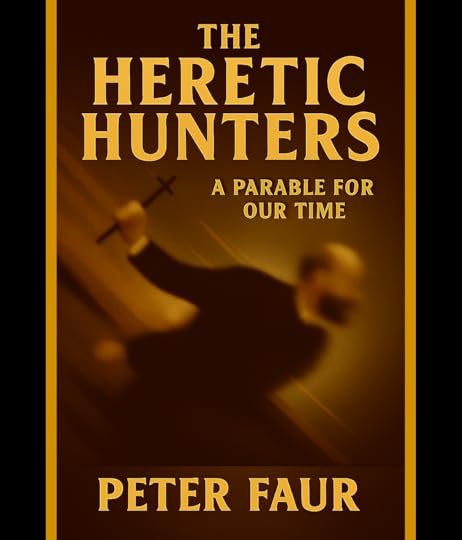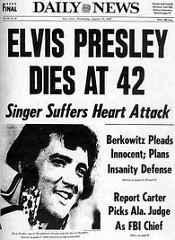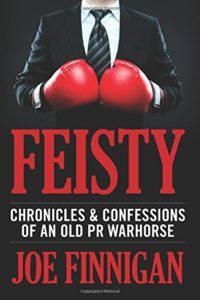Peter Faur's Blog
September 27, 2025
Why I Wrote The Heretic Hunters

It’s a novel about politics dressed in church vestments, about power masquerading as purity, and about the quiet courage of those who refuse to play along.
Even as a young boy, before I knew who the notorious Joe McCarthy was, I understood the strategies and tactics of people like him. I saw them play out not in history books, but in black-and-white morality tales on my television screen. Rod Serling’s Twilight Zone was my first education in authoritarian psychology.
In the episode Four O’Clock, Theodore Bikel plays Oliver Crangle, a fanatic convinced that he can rid the world of evil by asking God to shrink every “bad” person to two feet tall. He keeps obsessive records, harasses strangers, and believes he’s on a divine mission. At four p.m., his plan works — but not as he intended. Let’s just say he had to start looking up at people he had been looking down on.
In The Obsolete Man, Burgess Meredith plays Romney Wordsworth, a librarian condemned to death by a totalitarian regime for being “obsolete.” After all, people didn’t need libraries anymore. The state would tell them anything they needed to know. Wordsworth’s quiet defiance exposes the hollowness of the state’s authority and affirms the dignity of moral courage in the face of annihilation.
These stories helped me realize that authoritarianism doesn’t always wear a uniform. Sometimes it wears a clerical collar.
I am a product of the Lutheran Church–Missouri Synod, attending its schools through grade school, high school, and college. Only when I went to graduate school in journalism at Kansas State in 1973 did I study outside the system.
During my senior year of college and beyond, the synod began its pursuit of so-called “teachers of false doctrine.” I recognized the pattern of smear tactics, power politics, and authoritarian governance Rod Serling had illuminated. Professors at synodical colleges, most notably Concordia Seminary in St. Louis but elsewhere as well, were accused of undermining the Bible because they used historical-critical methods to study scripture. The forums they were given to respond were convened by their accusers and were far from impartial.
The controversy escalated until the seminary president, John Tietjen, was suspended. Most of the faculty and students walked out, forming a new institution in exile — Seminex. In retrospect, I believe each suspected faculty member should have stayed and forced upwards of fifty separate heresy trials, but that reckoning is long behind us.
I knew some of the people who were targeted. They were among the most thoughtful, compassionate, and faithful individuals I’d ever met. Whatever theological disagreements existed, they didn’t deserve the treatment they got. The whole episode opened my eyes to how easily institutions can sacrifice conscience for control.
Today, as the United States flirts with authoritarianism once again, I felt compelled to revisit this story. Not as a history lesson, but as a parable and a warning. The Heretic Hunters is fiction, but it’s rooted in truth — the kind of truth that Serling understood and fought for.
This novel is for anyone who’s ever been called unloyal for asking hard questions. It’s for those who believe that a strong ethical foundation, not short-term, self-interested transactions, should guide our institutions. And it’s for readers who know that the real battle is not between right and left, but between right and wrong.
If this story resonates with you — if you’ve ever watched institutions sacrifice decency for control, or seen good people branded as heretics for asking hard questions — I invite you to read The Heretic Hunters. Because sometimes fiction is the only way to tell the truth.
It’s available now for preorder at major online book retailers. The book will be released in both print and e-book editions. You can download a free excerpt. And if you’d like, go to the Ash & Creed Press website to sign up for updates about The Heretic Hunters and future releases as well.
December 18, 2019
My book clubs’ selections for 2019

Here are the books my two book clubs read in 2019, month by month. Check them out. You might find a few to be of interest. At the bottom of the article, you’ll find links to the books we read in 2010, 2013, 2014, 2015, 2016, 2017, and 2018. (Yeah, I slacked off for a couple of years.)
January
There There by Tommy Orange. What does it really mean to be an Indian/Native American/American Indian/Native? Orange’s vivid debut novel allows a unique cast—ranging from teenagers to elders—to ...
My book clubs’ selections for 2019

Here are the books my two book clubs read in 2019, month by month. Check them out. You might find a few to be of interest. At the bottom of the article, you’ll find links to the books we read in 2010, 2013, 2014, 2015, 2016, 2017, and 2018. (Yeah, I slacked off for a couple of years.)
January
There There by Tommy Orange. What does it really mean to be an Indian/Native American/American Indian/Native? Orange’s vivid debut novel allows a unique cast—ranging from teenagers to elders—to pull...
December 7, 2018
My book clubs’ selections for 2018
[image error][image error]I joined a second book club in 2018, so I’m sharing the books both clubs read,  month by month. Check them out. You might find a few to be of interest. At the bottom of the article, you’ll find links to the books my original book club read in 2010, 2013, 2014, 2015, 2016 and 2017. (Yeah, I slacked off for a couple of years.)
month by month. Check them out. You might find a few to be of interest. At the bottom of the article, you’ll find links to the books my original book club read in 2010, 2013, 2014, 2015, 2016 and 2017. (Yeah, I slacked off for a couple of years.)
January—Fahrenheit 451[image error]. Ray Bradbury’s internationally acclaimed novel Fahrenheit 451 is a masterwork of twentieth-century literature set in a bleak, dystopian future. Guy...
December 13, 2017
My book club’s selections for 2017
 Here are the books my book club read in 2017. Check them out. You might find a few to be of interest. At the bottom of the article, you’ll find links to the books we read in 2010, 2013, 2014, 2015 and 2016.
Here are the books my book club read in 2017. Check them out. You might find a few to be of interest. At the bottom of the article, you’ll find links to the books we read in 2010, 2013, 2014, 2015 and 2016.
January—Hillbilly Elegy by J.D. Vance – A young, Scots-Irish lawyer who grew up in Tennessee and rural Ohio provides his insights into modern rural culture. He also discusses the factors that helped him push beyond his limited upbringing to the Marines, Yale Law School, and success as a Sa...
November 15, 2017
15 tips for managing your time
Thanks to Jack Milgram for this infographic! Some great tips here.
t
Infographic by Jack Milgram Custom-Writing.Org

September 21, 2017
Quiz: Find the exercise regime that matches your personality
Find Your Ideal Exercise Match Group Activities You’re a competitive, spontaneous exercise machine. You thrive testing your abilities against others whether it be on the track or at the gym. Recommended Workouts: – Team Sports – Competitive Running – Martial Arts – Zumba – Spinning Solo Workouts You’re confident in your abilities and don’t mind being around others when working out but prefer to focus on your own development. Recommen...
August 16, 2017
The day Elvis died
 Certain stories set an entire newsroom buzzing, and word of the death of Elvis Presley, 40 years ago today, spread like wildfire throughout the St. Louis Globe-Democrat. I had worked there for eight months, still getting used to the rhythms and quirks of the city’s lesser known newspaper. I stood far outside the inner circle of managing editors, city editors, feature editors and others who made decisions about what was and was not newsworthy. That, incidentally, would remain true for the enti...
Certain stories set an entire newsroom buzzing, and word of the death of Elvis Presley, 40 years ago today, spread like wildfire throughout the St. Louis Globe-Democrat. I had worked there for eight months, still getting used to the rhythms and quirks of the city’s lesser known newspaper. I stood far outside the inner circle of managing editors, city editors, feature editors and others who made decisions about what was and was not newsworthy. That, incidentally, would remain true for the enti...
April 10, 2017
An old warhorse dishes on the PR industry
 I worked eight years for Fleishman-Hillard, one of the world’s premier public relations agencies. During that time, I often thought we ran the world, and I’m being only slightly facetious. On any given day, those capable of digging behind the headlines often would find that F-H played a role. We drove a wide array of issues, from fighting increased beer taxes to saving manatees, from speaking out for riverboat gambling to urging America to “change your clock, change your batteries” (smoke det...
I worked eight years for Fleishman-Hillard, one of the world’s premier public relations agencies. During that time, I often thought we ran the world, and I’m being only slightly facetious. On any given day, those capable of digging behind the headlines often would find that F-H played a role. We drove a wide array of issues, from fighting increased beer taxes to saving manatees, from speaking out for riverboat gambling to urging America to “change your clock, change your batteries” (smoke det...
February 7, 2017
A review: Bitter Brew
 Bitter Brew: The Rise and Fall of Anheuser-Busch and America’s Kings of Beer by William Knoedelseder
Bitter Brew: The Rise and Fall of Anheuser-Busch and America’s Kings of Beer by William Knoedelseder
My rating: 5 of 5 stars
William Knoedelseder’s book captures the larger-than-life story of five generations of a family who piloted America’s premier brewing company through the Civil War, Prohibition, two world wars, and a developing global market that ultimately proved to be too great a match for them. It’s an excellent read.
Like the Kennedys, the Busches have had more than their share of s...



